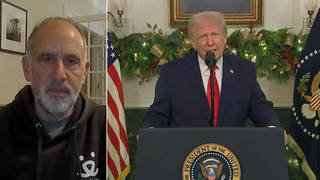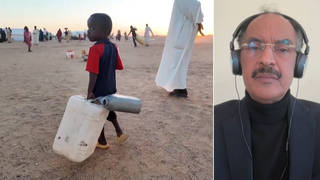Hi there,
For nearly 30 years, Democracy Now! has gone to where the silence is. Our reporting provides news you can’t find anywhere else and helps maintain an informed public, which is critical for a functioning democracy. Please donate today, so we can keep amplifying voices that refuse to be silent.
Every dollar makes a difference. Thank you so much!
Democracy Now!
Amy Goodman
Hi there,
For nearly 30 years, Democracy Now! has gone to where the silence is. Our reporting provides news you can’t find anywhere else and helps maintain an informed public, which is critical for a functioning democracy. Please donate today, so we can keep amplifying voices that refuse to be silent.
Every dollar makes a difference. Thank you so much!
Democracy Now!
Amy Goodman
Non-commercial news needs your support.
We rely on contributions from you, our viewers and listeners to do our work. If you visit us daily or weekly or even just once a month, now is a great time to make your monthly contribution.
Please do your part today.
HeadlinesApril 24, 2007
Democrats Back Iraq Pullout Date in Spending Bill
Democrats have reached consensus on the congressional war spending measure calling for a nonbinding timetable for the withdrawal of U.S. troops from Iraq. The bill provides nearly $100 billion for the wars in Iraq and Afghanistan. It calls for U.S. troops to begin withdrawing no later than October 1 with a deadline of April of next year. A House vote is expected on Wednesday followed by the Senate on Thursday. At the White House, President Bush repeated his pledge to veto the bill.
President Bush: “I believe strongly that politicians in Washington shouldn’t be telling generals how to do their job. And I believe artificial timetables of withdrawal would be a mistake. An artificial timetable of withdrawal would say to an enemy just wait them out, it would say to the Iraqis don’t do hard things necessary to achieve our objectives, and it would be discouraging for our troops.”
Despite the president’s opposition, antiwar lawmakers and activists have also criticized the bill for providing more funds for the Iraq War and making the timetable nonbinding.
68 Iraqis, 9 U.S. Troops Killed in Iraq Violence
Meanwhile in Iraq, at least 68 Iraqis were killed in violence around the country Monday. And at least nine U.S. troops were killed in a suicide bombing north of Baghdad. It was one of the deadliest ground attacks on the U.S. military since the start of the Iraq War. Another 20 soldiers were wounded. Eighty-five U.S. servicemembers have been killed this month, the most since December.
Baghdad Residents Protest Wall Construction
In Baghdad, hundreds of residents rallied Monday against plans for a 12-foot-high concrete wall to divide Sunni and Shiite neighborhoods. The U.S. is walling off at least 10 neighborhoods despite opposition from Iraqi leaders. A Baghdad resident accused the U.S. of fueling sectarian tensions.
Baghdad resident: “There is no need for this wall. There is no benefit from what has been done. They are seeking to create sectarian strife between the two sects. There is no difference between the Sunnis and Shiites. We are all Iraqis, and we are all Muslims.”
The protests came as Iraqi Prime Minister Nouri al-Maliki said he had ordered a stop to the wall’s construction. U.S. Ambassador to Iraq Ryan Crocker defended the plans and said they were led by the Iraqi government.
U.S. Ambassador to Iraq Ryan Crocker: “I think the Baghdad security plan, led by Iraq and supported by the coalition, can buy time. But what it does is buy time for what ultimately has to be a set of political understandings among Iraqis. So I think these months ahead are going to be critical, as this plan continues forward to increase security and gain the time, but most especially as Iraqis then try to use that time to grapple with some of these difficult issues.”
Death Toll Rises in Somalia Clashes
In Somalia, clashes between U.S.-backed Ethiopian forces and fighters aligned with Somalia’s Islamic Courts Union continue to cause heavy casualties. There are reports of at least 18 dead Monday as fighting enters a seventh day. The death toll over the past week has now reached more than 250. The United Nations says more than 320,000 Somalis have fled the capital Mogadishu since February. Aid agencies have warned of a major humanitarian crisis. The Associated Press reports Mogadishu’s hospitals are filled to capacity with barely enough bandages for the wounded and dwindling medical supplies.
Boris Yeltsin Dies at 76
Former Russian President Boris Yeltsin has died at the age of 76. Yeltsin came to power in 1991 as Russia’s first post-Soviet head of state replacing Mikhail Gorbachev. He led the country’s chaotic transition from communism to open-market capitalism before resigning in 1999. Critics blame Yeltsin for plunging his country into years of economic and political turmoil after he dissolved the Soviet Union. He also presided over the military campaign to crush Chechnya’s drive for independence. Yeltsin will be buried in Moscow Wednesday, which has been declared a national day of mourning.
Hamas Claims Rocket Strike on Israel
In Israel and the Occupied Territories, the military wing of the Palestinian group Hamas is claiming responsibility for a barrage of rocket attacks into Israeli territory. It’s the first time Hamas has claimed responsibility for a rocket attack in more than five months. No casualties have been reported. A Hamas spokesperson called the rockets a response to Israeli attacks that killed eight Palestinians, including a 17-year-old girl. Hamas agreed to a truce in November but has said it would respond to attacks on Palestinians.
Classes Resume at Virginia Tech
Back in this country, Virginia Tech opened its classrooms Monday, one week after the mass shooting that killed 32 people.
Virginia Tech student Amy Berry: “I have a lot of mixed emotions about it. Part of me is glad that the university has decided to continue classes, and the other part of me, like most students are going to be feeling on Monday morning, is anxious, anxiety about having to go to class because of what had happened just a week ago. It’s definitely a lot of mixed feelings.”
Scores of students, alumni and visitors attended memorials across campus. One memorial had 33 stones in a circle — including one for the killer, Seung-Hui Cho.
Virginia Tech student Kunmi Otitoju: “I just think it’s touching. It shows that people in this community have big hearts and really love people, including Cho.”
World Bank Oversight Board Calls on Wolfowitz to Resign
Paul Wolfowitz has received a new setback in his fight to keep his job at the helm of the World Bank. The Financial Times is reporting the World Bank’s independent oversight agency has asked for Wolfowitz’s immediate resignation. Wolfowitz has been at the center of controversy after it was exposed he ordered a major pay increase and promotion for his longtime companion, Shaha Riza. In a memo, the Independent Evaluation Group said Wolfowitz’s continued tenure would cause the bank “irreparable harm.” The call comes just days after a group of 42 former World Bank executives also urged Wolfowitz to step down.
Lynch, Tillman Focus of House Oversight Hearing
On Capitol Hill, two high-profile cases involving U.S. soldiers captured or killed in battle will come under scrutiny today in a congressional hearing into misleading information from the U.S. military. The House Committee on Oversight and Government Reform will look at the Pentagon’s role in the delayed admission the former football star Pat Tillman was accidentally killed by members of his own unit in Afghanistan. The Pentagon initially claimed Taliban fighters killed Tillman despite warnings from investigators on the ground. The House hearing will also cover the recovery of Private Jessica Lynch from capture in Iraq four years ago. Lynch and members of Tillman’s family are set to testify.
Obama: Bush Failed as World Leader
On the campaign trail, Democratic presidential hopeful Barack Obama unveiled his foreign policy platform at an event Monday in Chicago. Obama said President Bush has failed as a world leader.
Sen. Barack Obama: “This president may occupy the White House, but for the last six years the position of leader of the free world has remained open. And it’s time to fill that role once more.”
Study Questions Lethal Injection Use
A landmark scientific study has raised new doubts about the lethal injections used on death row prisoners. Researchers say the drug cocktail used for executions is unreliable and could render prisoners paralyzed but not unconscious. Prisoners are then subjected to extreme pain while being unable to cry out. Leonidas Koniaris, a University of Miami surgery professor who led the study, said, “This raises the possibility people are being tortured and you can’t see it because they are paralyzed. I’m not sure a civilized society should be doing this.”
25-Year Prisoner Becomes 200th Exonerated by DNA Test
Meanwhile, a Chicago prisoner has been exonerated in a rape conviction that’s jailed him for the last 25 years. Jerry Miller was cleared after DNA testing ruled him out as the rapist. The prison rights’ group Innocence Project says Miller is the 200th prisoner exonerated by DNA testing.
Border Agent Charged in Killing of Undocumented Immigrant
A Border Patrol agent has been charged in the shooting death of an unarmed Mexican immigrant earlier this year. Agent Nicholas Corbett is accused of first-degree and second-degree murder in the killing of Francisco Dominguez-Rivera. Corbett has claimed he was acting in self-defense, but witnesses say he fired while pushing Dominguez-Rivera to the ground.
NYPD Officers Accused of Repeating Racial Slurs
Here in New York, several female police officers have accused at least two male colleagues of repeating the racial slurs that led to the firing of the radio host Don Imus. On Monday, the female officers said a sergeant called them “hos” during a roll call. Another officer is then said to have repeated Imus’ description of the Rutgers basketball team as “nappy-headed hos.”
Pulitzer-Winning Journalist David Halberstam Dies in Car Crash
And the Pulitzer Prize-winning author and journalist David Halberstam has died. Halberstam was killed Monday in a car crash in northern California. Halberstam’s first reporting out of college covered the civil rights movement in the South. He went on to write Pulitzer-winning dispatches from Vietnam for The New York Times. He was the author of 21 books, including “The Best and the Brightest” about the Vietnam War. David Halberstam was 73 years old.
Most popular
- 1
- 2
- 3
- 4
Non-commercial news needs your support
Please do your part today.












Media Options